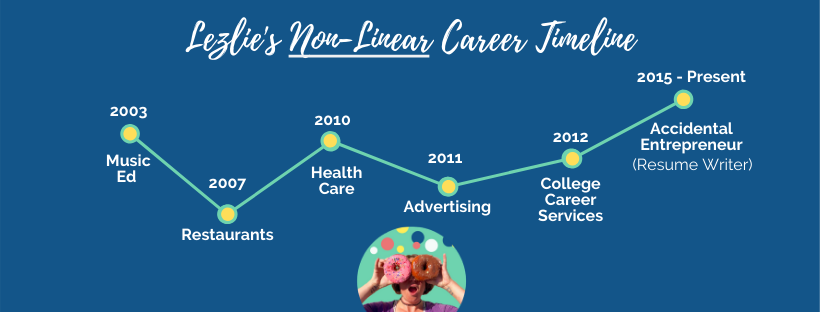You know how linear career paths used to be the norm, and making a full-scale career change was pretty unusual?
Yeah, that’s not really a thing anymore. In fact, 29% of respondents to a recent EdX survey said they have completely changed career fields since graduating college.
If you’re finding yourself considering a career change, you’re not alone. I’ve personally been through several career changes. When my first-choice career as a Music Educator didn’t pan out, I was pretty lost. Thankfully, I grew up with an HR genius parent (thanks mom!), so I had strong support on my side and some great know-how to find my way in the career world.
Without going into the details, I’ve worked in (deep breath):
teaching and restaurants and healthcare and advertising and career services and entrepreneurship.
For full effect, here’s a visual:
Not exactly linear, amiright?
So, when it comes to career transitions, I’ve been through a lot of changes and turmoil, and I understand the complexities and challenges of the career transition process.
I also get a lot of questions from clients and followers about how to make a successful career change, and many of these questions are consistently asked by clients across all career levels and industries. Questions like:
- How many times does the average person change careers?
- What is the best career to start at 40? Or 35? Or 50?
- What are the best mid-life career changes?
- What careers will have the most job openings?
- How do I get into a new career?
The truth is, there aren’t definitive, one-size-fits-all answers to questions like this. Even a career change quiz can only tell you so much with any degree of accuracy. The most important thing is for you, the career changer, to get gut-level honest about what makes you ‘tick’ and commit to doing the work it takes to get there.
To help you with that, I want to share what I’ve learned about the signs that come along with deciding to make a career change. My hope is that by illuminating this structure, this process we all go through in making major career changes, you will be able to make these decisions more easily and with less anxiety!
“Whether you liked it or disliked your previous career, it’s jarring and deeply unsettling at first, to move away from the very thing that, for years, represented a semblance of order, sense, and structure.”
– The 8 Stages of Career Transformation, Kathy Caprino
So, let’s dive right in to the 5 signs you want to make a career change (and what to do about it).
1. You yearn for Fridays and dread Mondays (and getting out of bed on weekdays, in general)
Of course, we all like weekends and having time to do non-work things. Even people who really like their work can sometimes look forward to the weekend like a little mini-holiday.
But if every workweek feels like a prison sentence, weekends are your only reprieve, and the dread of work Monday hits you on Sunday like a ton of bricks, then it may be time to rethink how you’re spending your weekdays.
Same goes for dragging-ass on getting out of bed on weekday mornings. If there’s absolutely nothing that excites you enough to want to get up and go to work, then you’re not doing work you love.
On this topic, it’s important to note that living-for-the-weekend could simply be a sign that you need a new job, not necessarily a new career. Here’s the difference:
- If you’re happy with the tasks you do and the responsibilities you have, but you hate your coworkers, your boss, or the work environment, then getting a new job could solve your problem.
- But if your tasks and responsibilities either bore you to tears or make you want to pull your hair out, then a whole new career is probably the right way to go (or at least something to consider).
“If you take a look at everything and realize that the problem isn’t your commute, your boss, or your company, but the actual work itself—then it’s time to consider a different type of work.”
– 2 Big Signs You Don’t Just Need a New Job, You Need a Whole New Career, Christie Mims
2. You aren’t feeling challenged and you just can’t seem to find motivation.
Maybe you’re not struggling to get out of bed or counting down the seconds until Friday, but if you’re feeling a lack of challenge and/or motivation in your work, these are also signs that a career change might be something for you to consider. Truly fulfilling work leaves us exhausted but energized at the end of a workday, with motivation to spare.
3. You feel constantly frustrated or trapped.
If you sit at your desk daydreaming about a different life and getting frustrated any time job-related work takes you away from those daydreams, it’s another sign that you’re not happy. You may have little room for professional development or growth within the company, or a relationship with supervisors that makes the job feel like a cage. Whatever the cause, it’s important to recognize this feeling and do something about it.
4. Your mind dwells on what-ifs and envy.
You spend your off hours (and even work hours) wondering what would have happened if you had gone into a different line of work or if you had taken that weird internship in college or if you had spent that year after college traveling the country like you wanted to.
Or maybe it’s when friends and family come to you with stories about how happy they are at work, and even though you’re happy for them, but you can’t help but wonder why they have it and you don’t.
These feelings of envy and regret are common when we need a full-scale career change, because it seems not matter what we’ve tried in our current career, it just doesn’t feel quite right.
5. Your health is being affected.
It’s no secret that stress is linked to all kinds of health problems, from high blood pressure to insomnia to poor eating habits. If you used to sleep well but don’t anymore, struggle to maintain your usual healthy eating, or have noticed other effects on your health since you started feeling less satisfied at work, then changing careers could be a wise choice.
Even if you’re not secretly wanting a career change, you might find yourself in some life phases that mean a career change is the best option for you.
Being unemployed or underemployed
Sometimes we may be happy (or, at least mostly happy) in our careers, but outside factors like a shift in the job market can make it difficult to continue on the same career path.
If you find yourself unemployed for long periods (even after you’ve built an awesome resume and polished your interview skills) or if you just can’t seem to climb the ladder any higher than where you are right now, then changing to a new career or industry could be exactly what you need to find new employment and continued career growth.
Natural or forced transition
These situations include coming back from maternity/paternity leave and open to new options, having a spouse relocated so you must give up your job, looking for an end-stage career, or even being injured so that your previous career is no longer an option (but you are still healthy enough to do other work).
What to Do Next
We’ve talked about a lot of different signs and situations that could mean a career change is in your future. And it’s possible that all this talk has you feeling worried, lost, conflicted, or otherwise disheartened.
I want you to know that those feelings are normal, and that you’re not alone in feeling that way. I also want you to know that they don’t have to last, and that creating a plan of action is the best way to ditch those feelings and replace them with confidence and self-assurance.
If you’re struggling to come up with a plan, you can get help.
Want more career-related goodness?
- Get a powerful 5-Step Resume Action Plan that will help you transform your resume into an interview-getting machine.
- Download my 54 Super Impressive Resume Action Verbs list by joining the Career Courage Facebook group.
- Find more DIY career resources here.
- Apply now for a free strategy call if you’re thinking about 1:1 services with a career expert.

